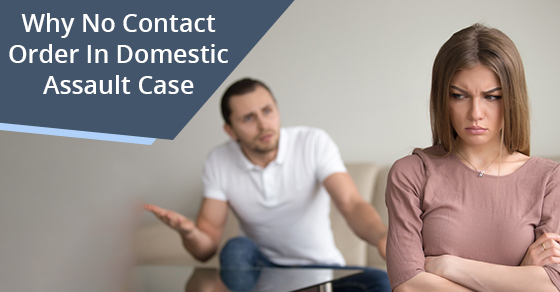Why is there a No Contact order in my domestic assault case?

In every single case of domestic violence, where the police arrest and charge someone, that defendant is prohibited from contacting the complainant. The defendant is also prohibited from living with the complainant, or from being anywhere she happens to be.
Why can’t I contact my wife/girlfriend?
There are three reasons why the police and the courts impose a No Contact order and refuse to lift it:
- To protect the complainant;
- Because the government is scared;
- Because the government wants to use the No Contact order as a bargaining chip.
Reason #1: Protecting the complainant
The government, through the police and the courts, wishes to protect the complainant from harm by preventing contact between her and the accused. The prohibition is also meant to prevent the defendant from pressuring the complainant to retract or recant her allegations. By separating the parties, the government is addressing those two concerns.
The problem is that the risks of further harm or manipulation do not apply in every case. In most cases, once the police are involved and charges have been laid, the defendant is sufficiently deterred from being violent again (assuming he was violent in the first place). Given this, why prevent the parties from communicating with each other? Why force the defendant to live elsewhere for several months while the case works its way through the courts? Especially if the complainant wants contact with the defendant, and wants him to return home? Arguments and fights often happen because of poor communication. By preventing contact, often for months, the government is only making that failure to properly communicate even worse.
What if she wants to resume contact?
The government’s “zero tolerance” policies are based on the idea that a complainant needs protection from her abuser and cannot be trusted to decide what is best for her. Because the government believes that the complainant is vulnerable to physical, emotional or financial pressure, the state’s wishes are given priority over those of the complainant.
Reason #2: The government is too scared to make tough decisions in domestic cases
Another reason that the government will not listen to the complainant’s views about contact, or letting the defendant return home, is that it is much easier and safer to say No in every single case, than to try to distinguish the serious cases from the less serious ones, or the situations where the complainant is more at risk. Despite the fact that the police, prosecutors, and court officials are called on to exercise their discretion in other cases all the time, and are educated and well-paid for it, when it comes to domestic violence, they refuse to examine these cases carefully. Instead, they take the easy and less risky way out, and assume that every case is potentially the worst-case scenario. A few well-publicized tragedies where a man has killed his wife and/or kids has scared the players in the justice system into taking the easy route of assuming every case might be a future murder, and imposing the strictest terms in every situation. The police impose the condition, and “pass the buck” to the prosecutors. The prosecutors “pass the buck” to the courts, or just say No.
Reason #3: The government uses the No Contact order as a bargaining chip
The government will never admit this, but they use the No Contact order to try to pressure the defendant to plead guilty. In most cases, the Crown will take the position in negotiations that they will not lift the No Contact order or permit the defendant to return home, unless and until he pleads guilty. If he pleads guilty, the Crown and the court will let the him resume contact with the victim and permit him to return home, if she consents. This seems counter-intuitive: when a defendant is presumed innocent, the state deems him too dangerous to permit contact; but if he is found guilty, then he is now safe to return home? How does that make sense? It doesn’t. But the government knows that the No Contact order creates hardship in many instances, damaging family relationships and family finances. By dangling the “carrot” of a promise to lift the No Contact order, the government seeks to persuade defendants to plead guilty. Refuse the offer, and you are looking at many months, perhaps a year, before a trial, and the government will keep the No Contact order firmly in place until then.
Despite the tight restrictions on lifting No Contact orders, Arun S. Maini at The Defence Group has often been successful in doing so through negotiations and court proceedings. For further information, contact Arun at The Defence Group or click here

